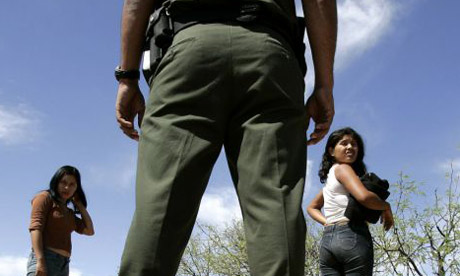
The U.S. border patrol received two Black Hawk helicopters from the Department of Homeland Security last Friday, the latest in a trend of increasing military strength for the U.S. border patrol agency that is worrying the Mexican government.
Last week, Texas Gov. Greg Abbott signed a sweeping border security bill that will increase the number of state troopers on the border and fund technology upgrades for border protection.
Meanwhile, an internal investigation into 67 uses of force by border patrol agents—19 of which led to someone’s death—ended with agents determined not-guilty of criminal misconduct in all but one case (which is still under review), a Customs and Border Protection spokesperson told Fusion. The investigation results were first reported on Monday by the Los Angeles Times.
Office of Rep. Henry Cuellar
One of the blackhawk helicopters deployed to the border.
While the Black Hawks are a small portion of the larger patrol, they’re perhaps the clearest symbol of a militarized response to the border. Made famous in the movie Black Hawk Down, the helicopters played key roles in U.S. military invasions of countries like Grenada, Panama, and Haiti, as well as the Gulf War, the Iraq War and the war in Afghanistan.
The deployment was decided after a border patrol helicopter washit with gunshots on June 5 and made an emergency landing near Laredo, Tex. (The agent aboard was not hurt.) FBI Special Agent Michelle Lee told Fusion that the investigation into the shooting incident is ongoing and declined to comment on which side of the border the gunshot came from.
The Black Hawks for border patrol will not have guns attached to them, but the agents riding them will be armed, and will return fire if fired upon, CBP says.
So is the Mexican border becoming our next war zone? Congressman Henry Cuellar, the Texas Democrat who represents Laredo, says it’s more about mounting a strong defense. “We don’t want to militarize the border, but we do want to protect our men and women,” he told Fusion. “Our choices are very simple: we can either stop flying surveillance missions, or the bad guys win.”
The border Black Hawks follow the passage of a $310 million bill in Texas last week that will see to 250 state troopers replacing national guard units at the border. Last summer, the national guardwas called to the border as illegal crossings rose, and the new troopers will take their place this summer. “The issues exist in the first place because we have a failed federal government that has refused to address the issues to tackle those problems,” Abbott said as he signed the bill. “Texas is willing to shoulder the responsibility.”
The increasing militarization is raising eyebrows across the border.
“The legislation creates divisions between our societies and opposes the principles and values that govern the bilateral relation between Mexico and the U.S.,” the Mexican foreign ministry said in a statement. The government also agreed to assist the U.S. investigation into the helicopter shooting.
Disputes over border militarization are one rough spot in a bilateral relationship defined by large amounts of trade, tourism, and educational exchanges, said Congressman Cuellar, who met with the Mexican Ambassador Monday morning. “I can understand the concerns from the Mexicans,” he said. “On our side, everybody’s got to do what they have to do.”
These recent developments are putting more military force in the hands of a border patrol agency dogged by accusations of inadequate oversight.
Customs and Border Protection, the largest law enforcement agency in the U.S., started a working group to review incidents where officers may have used excessive force—an effort that has not produced results: Of 67 use of force incidents between January 2010 and October 2012 that were examined by an internal committee, 15 received close examination and five were referred to the border patrol’s office of internal affairs. Only one is still under review, Michael Friel, a CBP spokesperson, told Fusion. TheLos Angeles Times reported that no officers have been charged with a crime—including several officers who shot and killed people—and only two officers received “oral reprimands.”
“What we’ve seen is an increase in human civil rights violations because of this very rapid militarization without oversight,” Vicki Gaubeca, the director of the ACLU’s Regional Center for Border Rights in New Mexico, told Fusion. “They have this attitude of impunity, they can do whatever they want.”
People were only allowed to file written complaints against officers in Spanish for the first time last month, the Timesreported. “If there is misconduct, they should let the legal process take its course,” Cuellar said.
Six border patrol incidents since 2010 have involved the fatal shooting of someone standing on Mexican soil, a situation that has sparked debates over constitutional law. A federal appeals court in New Orleans ruled in April that the family of Sergio Adrian Hernandez, an unarmed 15-year-old boy who was shot and killed in Mexico by a border patrol agent in the U.S., cannot sue the agent.
The court said in its ruling that Hernandez did not deserve Fifth Amendment rights because he was “an alien who had no significant voluntary connection to, and was not in, the United States when the incident occurred.”
Similar cases are progressing through other courts.




No comments:
Post a Comment